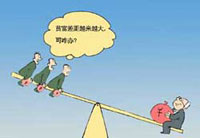 |
|
Rich-poor divide is serious, according to a study.
|
About 90 per cent of Chinese believe the polarization between the rich and poor is "serious" in China, according to a survey conducted by China Youth Daily.
And more than 80 per cent of the respondents surveyed said something must be done to narrow the expanding gap between the rich and poor, while 14.1 per cent said it was unnecessary.
The polarization has aroused wide concern among the public in recent years.
The State Development and Reform Commission said the Gini Coefficient, a measure of income inequality, had reached 0.47 for China, up from 0.29 two decades ago.
Usually, a country with a ratio exceeding 0.4 is warned to pay more attention to theinequalityissue.
To find out the people's view, the survey covered 10,250 respondents, between the ages of 20 and 30 with a college education and a monthly salary between 1,000 and 3,000 yuan.
Surprisingly, most disagreed with the view of experts who claim the urban-rural disparity is causing the widening gap.
More than 70 per cent of the respondents believed that "the group of special interests" is the prime reason for the polarization.
Followed by "people in power" 68 per cent, and "bosses" 50 per cent.
Another unexpected finding almost all agreed that a good educational background and knowledge were not the decisive factors in gaining wealth.
About 95 per cent said rich people are not necessarily those who are able to speak English or have a college education.
Today in China, rich people, accounting for 10 per cent of the population, control 45 per cent of the total social fortune, and poor people, also 10 per cent of the population, only control 1.4 per cent, according to an investigation published by the National Bureau of Statistics last June.
点击查看更多双语新闻
(China Daily)
|
《中国青年报》日前开展的一项调查显示,约90%的中国人认为目前国内的贫富悬殊问题“很严重”。
80%以上的调查对象认为,必须采取一些措施缩小贫富差距,而14.1%的人则认为没有这个必要。
近年来,贫富悬殊问题引起了民众的普遍担忧。
据国家发改委介绍,目前我国衡量收入差距的“基尼指数”已达到了0.47,比20年前高0.29。
通常来说,如果一个国家的基尼指数超过了0.4的警戒线,其贫富差距问题就比较严重了。
为了了解民众对这一问题的看法,《中青报》共对10250人进行了调查,这些调查对象年龄在20岁至30岁间,受过高等教育,月收入在1000至3000元之间。
令人惊讶的是,调查发现大多数人并不认同专家所说的“城乡差距是导致贫富差距不断扩大的主要原因”。
70%以上的调查对象认为“特殊利益集团”的存在是导致贫富悬殊的主要原因。
68%的人认为是“权力人士”,50%的人则认为是“大老板”。
出人意料的是,几乎所有调查对象认为“良好的教育背景和丰富的知识”并不是成为“有钱人”的决定性因素。
约95%的调查对象说,有钱人并不一定“会说英语”或“上过大学”。
国家统计局今年6月公布的一项调查显示,目前中国的富人占总人口的10%,却占据了45%的社会总财富;穷人数量也占总人口的10%,但只拥有社会总财富的1.4%。
(英语点津姗姗编辑)
|